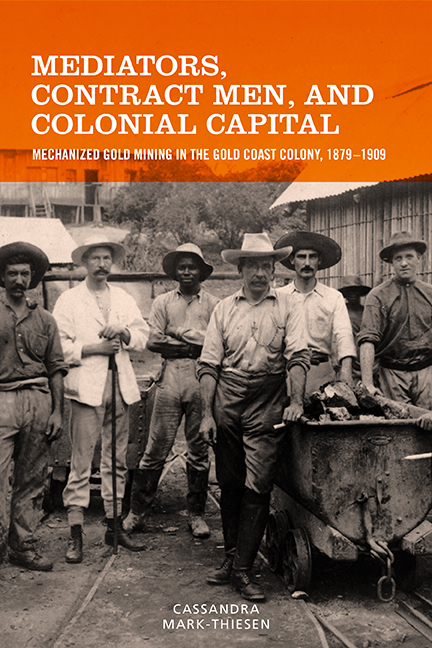 Mediators, Contract Men, and Colonial Capital
Mediators, Contract Men, and Colonial Capital Book contents
- Frontmatter
- Dedication
- Contents
- List of Illustrations
- Acknowledgments
- Introduction
- 1 Prospectors, Politicians, and the Question of “Progress”: The First and Second Gold Booms in Wassa
- 2 Labor Recruitment in the Nineteenth Century: The Place of Practicality
- 3 Disrupted Recruitment at the Turn of the Twentieth Century: Women, Whites, and Other Labor Agents
- 4 Government Strategies for Assisting the Mines
- 5 Labor Agents, Chiefs and Officials, 1905–1909: The Incorporation of the Northern Territories’ Labor Reserve
- Conclusion
- Notes
- Bibliography
- Index
1 - Prospectors, Politicians, and the Question of “Progress”: The First and Second Gold Booms in Wassa
Published online by Cambridge University Press: 29 May 2021
- Frontmatter
- Dedication
- Contents
- List of Illustrations
- Acknowledgments
- Introduction
- 1 Prospectors, Politicians, and the Question of “Progress”: The First and Second Gold Booms in Wassa
- 2 Labor Recruitment in the Nineteenth Century: The Place of Practicality
- 3 Disrupted Recruitment at the Turn of the Twentieth Century: Women, Whites, and Other Labor Agents
- 4 Government Strategies for Assisting the Mines
- 5 Labor Agents, Chiefs and Officials, 1905–1909: The Incorporation of the Northern Territories’ Labor Reserve
- Conclusion
- Notes
- Bibliography
- Index
Summary
As was the case in other parts of the world, the discovery of gold in Wassa in the 1870s stimulated the development of infrastructure for the exploitation of this metal, as well as the implementation of governance mechanisms to keep in check a large wave of unruly immigrants. Yet the slow speed and limited capacity of such advancements in the region set West African mining apart. Many of the earliest entrepreneurs in Wassa during the first gold rush in the 1870s and 1880s were former political officials and local European traders who tried to keep up production in spite of rather costly and irregular means transportation, since their petitions for public investment and services for the mining centers largely fell on deaf ears. Still, they hoped to make a considerable return from local gold deposits using alluvial mining techniques and light stamps that were generally transported to the interior either on the Ankobra river or on the heads of female porters. The construction of a government railway was slow moving. As a result, it took some twenty years for it to connect the area to the coast. Still, this was an accomplishment that played a key role in attracting an influx of significant South African mining capital, which in turn drew in more experienced mining directors and working-class miners from Britain, South Africa, and Australia in the early twentieth century. Also instrumental to the making of the second gold boom, which was referred to as the “jungle boom” in the international press, was the installation of heavy machinery, which brought West African gold-mining capacity up to global technological standards starting in the 1890s.
Debates over the labor question show that if efficient transportation was slow to arrive, proper colonial administration lagged even further behind. Therefore, this chapter introduces the colorful group of entrepreneurs whose ideologies, politics, and cutthroat promotion helped to shape large-scale mining in this loosely governed British protectorate, located far from colonial headquarters in Accra. It attempts to capture the character and background of the most prominent mining men during both boom periods. In the nineteenth century, when lobbying for the mining sector was in its earliest stages, mining magnates held a wide range of opinions on how best to tackle the labor question.
- Type
- Chapter
- Information
- Mediators, Contract Men, and Colonial CapitalMechanized Gold Mining in the Gold Coast Colony, 1879–1909, pp. 16 - 51Publisher: Boydell & BrewerPrint publication year: 2018


